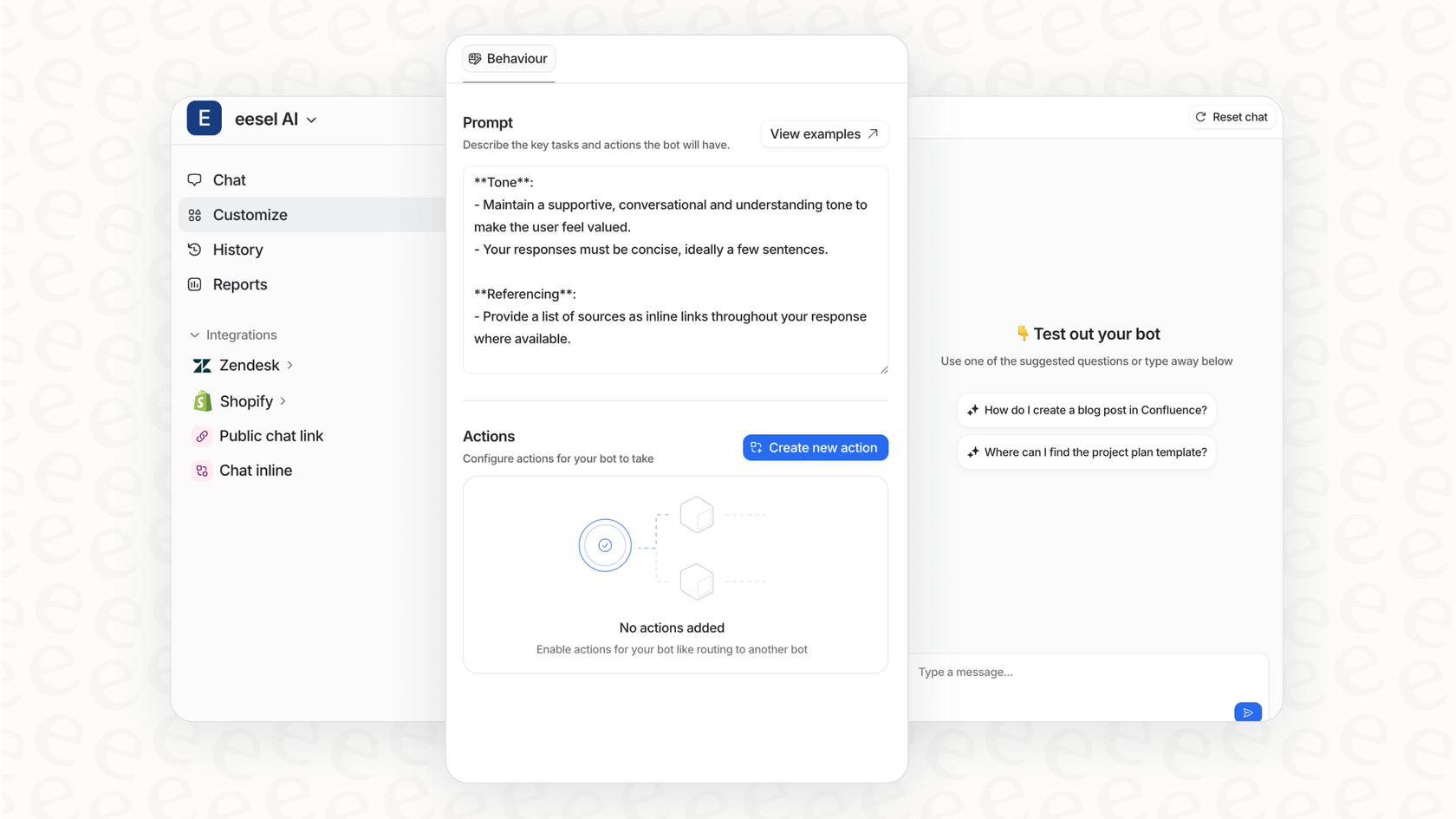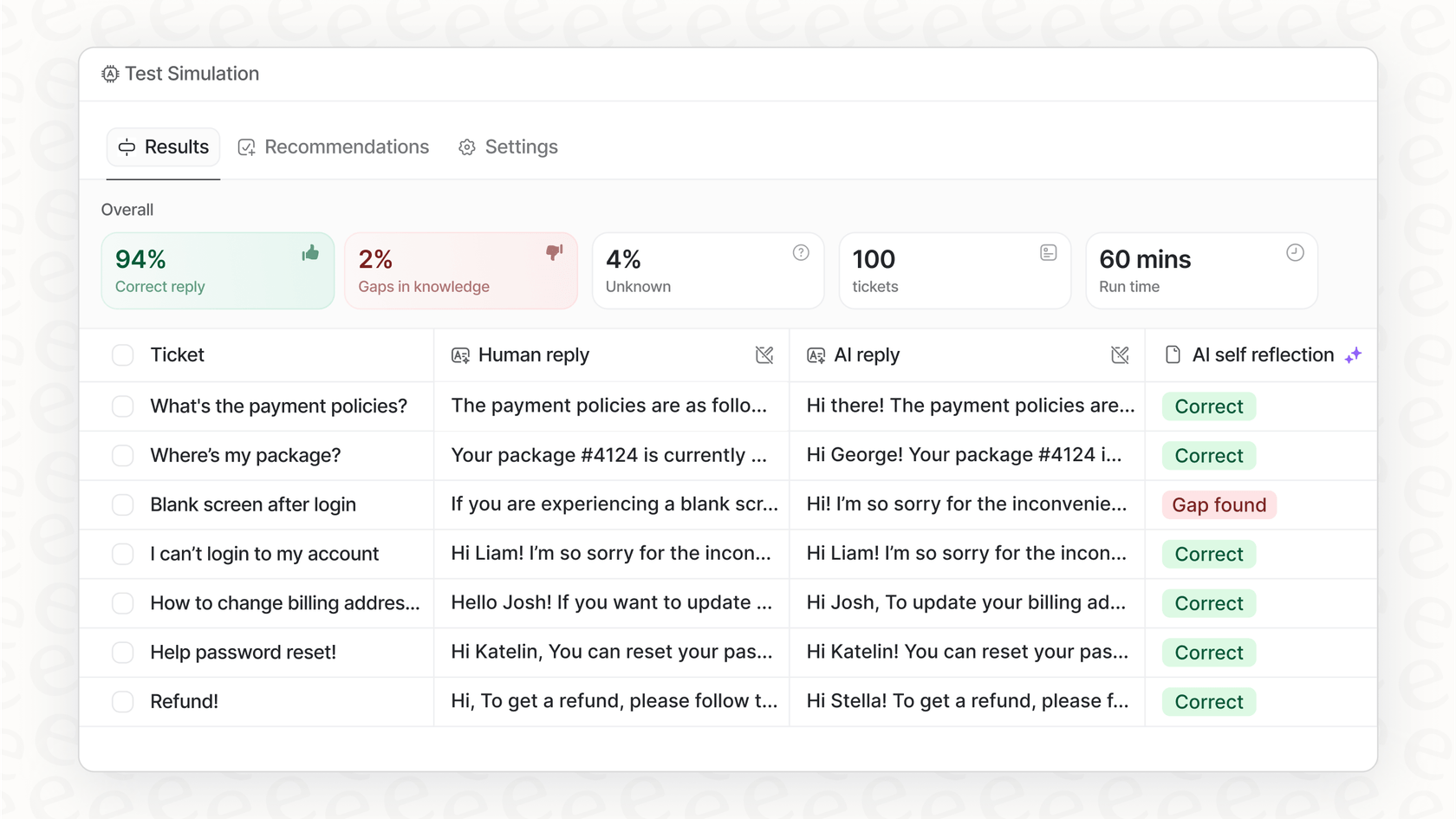
Trying to choose between Google's Gemini and Microsoft's Copilot feels like a big commitment, doesn't it? The AI assistant race is pretty much down to these two giants, and both are promising to completely change the way we work. The catch? They want you to do it all from within their own ecosystems.
This leaves most businesses stuck in the middle, trying to figure out which horse to back while worrying about getting locked into a single platform.
And let's be honest, while both tools are impressive all-rounders, they can feel like overkill for specialized jobs. Sure, they can help you write an email, but can they actually solve a customer’s problem from start to finish? For teams in customer support, that's the only thing that really matters.
This guide is a straightforward look at the Gemini vs Copilot debate. We’ll cut through the marketing fluff and compare their features, pricing, and integrations from a practical business perspective. We'll also talk about their limits and point you toward a more flexible option for your support and internal knowledge needs.
Gemini vs Copilot: What are they?
Before we get into a side-by-side comparison, let’s quickly cover what these two AI assistants actually are. At their heart, they're both meant to be productivity sidekicks, but they come from different worlds.
Google Gemini is Google's take on a built-in AI helper. It's a conversational and creative assistant that's woven directly into the Google Workspace you already know. If your team lives in Google Docs, Sheets, and Gmail, Gemini is designed to feel like it’s always been there, powered by Google's own AI models.
Microsoft Copilot is Microsoft’s AI assistant, running on OpenAI's well-known models like GPT-4. It’s embedded across the entire Microsoft 365 suite (Word, Excel, Teams, you name it) and is even built into the Windows operating system. It works like a smart layer on top of the tools millions of us use every day.
The easiest way to think of them is as "ecosystem plays." They’re designed to make their parent company's software suites more valuable and, well, stickier.
Gemini vs Copilot: A head-to-head feature comparison
When you put Gemini and Copilot next to each other, you start to see how their core technology and design lead to different strengths. Here’s a look at the features that really matter for business teams.
| Feature | Google Gemini | Microsoft Copilot |
|---|---|---|
| Underlying AI Model | Gemini 1.5 Pro / 2.5 Pro | OpenAI GPT-4, GPT-4o, DALL-E 3 |
| Context Window | Up to 1 million tokens (Advanced) | 128,000 tokens |
| Core Ecosystem | Google Workspace (Docs, Sheets, Gmail, Drive) | Microsoft 365 (Word, Excel, PowerPoint, Teams) |
| Best For | Real-time research, creative content, analyzing large documents, Google-centric teams. | Structured productivity tasks, data analysis in Excel, enterprise workflows, Microsoft-centric teams. |
| Customization | "Gems" for creating personalized assistants. | "Custom GPTs" and Copilot Studio for business workflows. |
| Data Security | Built on Google's security framework; offers advanced data protection in enterprise plans. | Enterprise-grade security via Microsoft 365, with advanced compliance features. |
Core AI models and performance
The engine running everything is a big deal. Gemini is built on Google's own powerful architecture, giving it an edge in certain areas. Copilot, on the other hand, uses OpenAI's models, which have been the gold standard for language tasks for a while.
One of Gemini's most talked-about advantages is its huge context window. The paid version can process up to 1 million tokens. What does that actually mean? It means you could drop a 700-page book into Gemini and ask it detailed questions without it losing the plot. Copilot's 128,000-token window is still large, but it can't handle that kind of volume in one go.
Ecosystem integration and workflow automation
Both assistants are at their best inside their "walled gardens." Copilot is fantastic within Microsoft 365, and Gemini shines in Google Workspace. This deep integration is their main selling point, but it's also their biggest weakness.
The reality for most companies is that knowledge is messy. It's scattered across apps like Confluence, Notion, Slack, and helpdesks like Zendesk or Freshdesk. If you rely only on Gemini or Copilot, you’re stuck trying to move everything into their world, which just isn't realistic.
A better way is to use a tool that connects to all your existing sources. For instance, eesel AI plugs into over 100 different tools, including Google Docs and Confluence, to pull all your scattered knowledge into one reliable brain for your AI assistant.
Customization and control
Both platforms let you build your own custom assistants. Gemini has "Gems," and Microsoft has Copilot Studio. They’re great for creating AI agents for specific tasks, but they can be technical to set up and, once again, they keep you locked into their ecosystem.
This can be pretty limiting. For teams that just need to get something up and running fast, a self-serve platform is a much better fit. With eesel AI, you can build, test, and launch a custom AI agent in just a few minutes, no developers needed. You can give your bot a unique persona, tell it exactly which knowledge sources to use, and even give it custom tasks to perform.

Pricing and plans explained
The sticker price for these tools looks simple enough, but the true cost is tied up in the ecosystem you're buying into.
Google Gemini pricing
-
Free: A solid version of Gemini is available for anyone to try out, giving you a good feel for its capabilities.
-
Gemini Advanced (Google AI Pro): At $19.99/month, this plan gets you the more powerful Gemini 1.5 Pro model and unlocks AI features inside Google Workspace apps.
-
Enterprise Plans: Google has custom pricing for larger organizations, usually bundled with Google Workspace enterprise licenses. These come with better security and admin controls.
Microsoft Copilot pricing
-
Free: The standard version of Copilot is built into Bing, the Edge browser, and Windows, and it runs on GPT-4.
-
Copilot Pro: For $20/user/month, individuals get priority access to the newest models and faster performance.
-
Copilot for Microsoft 365: This is the main business plan, costing $30/user/month with an annual commitment. You'll also need a separate Microsoft 365 Business license to get it working inside Word, Excel, and Teams.
The hidden costs: Why the sticker price isn't the whole story
The monthly fee is just the beginning. The real investment is committing your entire team to a single software universe. If your team uses a mix of tools, you're faced with a tough choice: either pay for expensive, time-consuming migrations or just accept that your shiny new AI assistant will have huge blind spots.
This video provides a direct comparison of Gemini vs Copilot to help you see their features in action.
This is where a more transparent pricing model comes in handy. For example, eesel AI's pricing is predictable and simple. There are no surprise per-resolution fees that penalize you for automating more customer questions. Since eesel AI connects directly to your existing tools, you skip all the hidden costs of moving your helpdesk or rewriting your knowledge base just to get your AI to work.
The limitations of Gemini vs Copilot for support teams
While Gemini and Copilot are jacks-of-all-trades, they tend to trip up when it comes to the specific needs of support and IT teams. They're built for broad productivity, not the action-oriented work that defines customer service.
They can talk, but can they do anything?
A general-purpose AI can write a polite response, but it can't actually do things. It can’t check an order status in Shopify, create a ticket in Jira Service Management, or apply the right tags in Zendesk. For a support team, that’s a dealbreaker. The goal isn't just conversation; it's resolution.
This is where a specialized tool has a clear advantage. An AI Agent from eesel AI can be given custom actions to handle these tasks automatically. It integrates with your helpdesk and other business systems to solve issues from start to finish, often without a human agent needing to step in at all.
Generic knowledge vs. trained expertise
Gemini and Copilot learn from the public internet and whatever documents you upload. This approach completely ignores the single most valuable source of knowledge for a support team: the thousands of past customer conversations already sitting in your helpdesk.
eesel AI works differently. It's built to automatically train itself on your historical helpdesk tickets. From day one, it learns your brand’s voice, understands the common problems customers face, and sees which solutions have actually worked before. This allows it to give answers that are spot-on and relevant, not just generic advice from a user manual.
The risk of deploying without a test drive
Letting a general-purpose AI talk directly to your customers is a bit of a gamble. There’s no good way to test its performance, figure out how it will affect your resolution times, or see where its knowledge gaps are. You're basically testing it live on your customers.
This is why eesel AI’s simulation mode is so useful. It lets you run a "dress rehearsal" by testing your AI setup on thousands of your past tickets in a safe, offline environment. You can see exactly how it would have performed, get accurate forecasts on your automation rate, and find any weak spots in your knowledge base. It gives your team the chance to fine-tune everything and deploy with confidence.

Gemini vs Copilot: Choosing the right AI assistant for your business
So, what’s the final call in the Gemini vs Copilot showdown? Honestly, it boils down to an ecosystem choice. Gemini is the obvious pick for Google-heavy teams that need a hand with creative work and deep research. Copilot is a better fit for businesses running on Microsoft, where getting structured tasks done is the priority.
But for specialized teams, neither is a perfect fit. They're generalist tools that ask you to work in their world, not the other way around.
For teams in customer support, IT, and internal helpdesks, a specialized platform is a much smarter move. eesel AI connects with the tools you already use, brings together knowledge from all your sources, and gives you the control and risk-free testing you need to automate support safely.
Don't settle for an all-rounder that only gets you halfway there. See what an AI platform built specifically for support can do for your team. Get started with eesel AI for free and you can build your first AI agent in minutes.
Frequently asked questions
Google Gemini is integrated into Google Workspace and uses Google's own AI models, excelling in real-time research and creative content with a large context window. Microsoft Copilot is embedded in Microsoft 365 and Windows, powered by OpenAI's GPT models, and is strong for structured productivity and enterprise workflows.
Both Gemini and Copilot are designed to make their parent company's software suites stickier, meaning they work best within Google Workspace or Microsoft 365, respectively. This can lead to platform lock-in if your business relies on a diverse set of tools outside these ecosystems.
The real investment lies in committing your entire team to a single software universe. If your team uses a mix of tools, you might face expensive, time-consuming data migrations or accept that your AI assistant will have significant knowledge blind spots.
These general-purpose AI assistants are built for broad productivity, not the action-oriented tasks crucial for support. They can write responses but often cannot perform direct actions like checking order statuses or creating tickets in external helpdesk systems.
While they integrate deeply within their respective ecosystems, their native integration with tools outside of Google Workspace or Microsoft 365 is generally limited. This often requires users to consolidate knowledge into their platforms, which may not be practical for complex workflows.
Yes, both platforms offer customization options: Gemini has "Gems" and Microsoft offers "Custom GPTs" and Copilot Studio. However, these often require technical setup and tend to keep the customized agents locked within their specific ecosystems.
Both platforms offer enterprise-grade security features, with Google Gemini built on Google's security framework and Copilot leveraging Microsoft 365's advanced compliance. Enterprise plans generally provide enhanced data protection and administrative controls for businesses.
Share this post

Article by
Kenneth Pangan
Writer and marketer for over ten years, Kenneth Pangan splits his time between history, politics, and art with plenty of interruptions from his dogs demanding attention.






